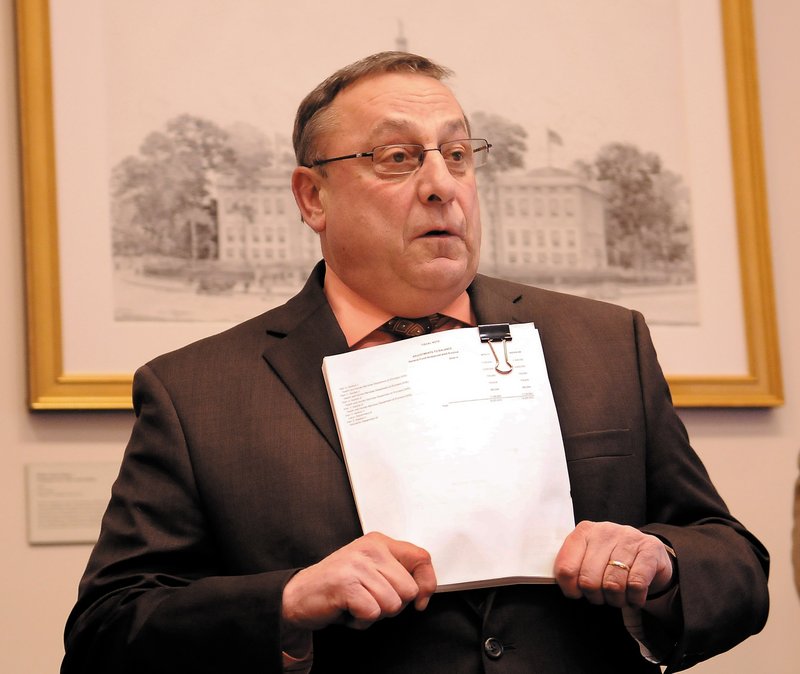AUGUSTA – Gov. Paul LePage is proposing a state budget for the rest of this fiscal year that includes money to make overdue payments to hospitals and support Medicaid coverage for thousands of Mainers.
The supplemental budget, released Wednesday, calls for $151 million in spending and $26 million in saving initiatives, such as leaving vacant positions open and maintaining curtailments set by Gov. John Baldacci.
The budget, which will go to lawmakers for review and a vote, is largely supported by a projected $111 million increase in state revenue.
“It’s purely a very fiscally responsible budget,” LePage said during a news conference in the Cabinet Room at the State House. “It addresses fiscal responsibility, saving jobs in health care and simplifying the tax codes.”
LePage is proposing to allocate $4.5 million so Maine can align with recent federal tax changes, reducing state revenue, in eight areas: the earned income tax credit; a student loan interest deduction; the phase-out of itemized deductions for high-income earners; a dependent care tax credit; a teacher expense deduction; charitable contributions from retirement plans; restaurant, leasehold and retail property; and the Small Business Jobs Act.
“That’s going to cost the state $4.5 million,” he said. “But the good news is, we’re putting that money in Maine people’s pockets, where it belongs.”
The categories in which Maine would align with the federal tax code would save money for an estimated 100,000 Mainers, according to statistics from the administration.
LePage also followed through on his campaign promise to speed up state payments to hospitals for Medicaid bills that date back to 2006. His budget sets aside $69.5 million, which would be combined with federal money for a total payment of $248 million to 36 hospitals.
That would leave about $150 million still owed to the hospitals. LePage hopes to address that in the two-year budget that starts July 1. That budget will be released next month.
Russell Begin, acting commissioner of the Department of Health and Human Services, said the budget for the period through June 30 also includes $39.4 million to help pay for an increase in Medicaid enrollment. The money would help to cover the 300,000 Mainers who are enrolled in MaineCare, the state’s Medicaid program.
Without it, the program will be out of money by mid-February, he said.
The DHHS would also get $32.4 million to help pay for the Medicaid program once the federal government begins reducing its payments, which had increased using federal stimulus money.
The supplemental budget is on a fast track to ensure that the Medicaid program does not run out of money, said Sawin Millett, LePage’s nominee to head the Department of Administrative and Financial Services. Hearings before the Legislature’s Appropriations Committee are set to begin Jan. 24.
Sen. Dawn Hill, D-York, a member of the Appropriations Committee, said members understand the need to move quickly on the budget.
“We stand to lose quite a bit in federal matching funds if we don’t,” Hill said. “Appropriations stands ready to roll up their sleeves and get going.”
LePage said he will work with lawmakers to get the two-thirds support needed to make the budget effective immediately. The budget is designed to bring the state’s spending plan into balance for the rest of this fiscal year, which ends June 30.
Budget documents show a $26.5 million balance in the state’s rainy day fund.
House Minority Leader Emily Cain, D-Orono, former co-chair of the Appropriations Committee, described LePage’s proposal as a “typical supplemental budget.”
“Primarily technical, primarily dealing with keeping the current fiscal year balanced, and not overly burdened with policy,” she said.
House Speaker Robert Nutting, R-Oakland, another former member of the Appropriations Committee, said in a prepared statement that he’s looking forward to getting more details on the supplemental budget.
“At first review, I’m pleased to see that the governor is aggressively pursuing his campaign pledge to pay off the hospitals as soon as possible, and take maximum advantage of federal matching funds,” he said. “This approach makes good fiscal sense, will ultimately save the Maine taxpayers a significant amount of money, and is simply the right thing to do.”
MaineToday Media State House Writer can be contacted at 620-7015 or at:
scover@mainetoday.com
Send questions/comments to the editors.


